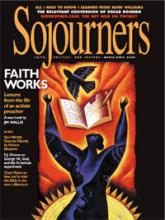Dogma, the latest film by suburbia-focused auteur Kevin Smith (writer-director of Clerks, Mallrats, and Chasing Amy), is a unique and tender homage to an all-loving and good Creator.
It is also chock full of mangled theology, extremely obscene language, and, with a couple of exceptions, some pretty crummy acting.
The horde of Smith fans who enjoy his films for their ribald expressions and accurate urban sprawl scenarios will find similar scenery and dialogue (and the reappearance of Jay and Silent Bob, the idiotic dudes whose characters are woven into every Smith film), but they also will find questions about creation, Gods omnipotence, and human destiny.
Smith claims to be a devout Catholic; Dogma is part of his effort to understand his faith and to express his devotion to God. He deserves credit for addressing an issue that much of mainstream Hollywood prefers to ignore. However, he cant seem to present a coherent message.
Read the Full Article
